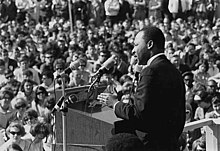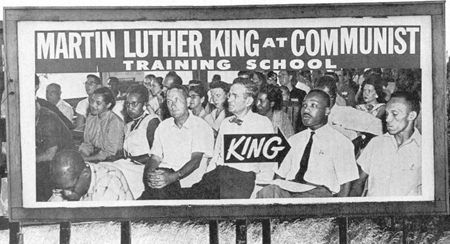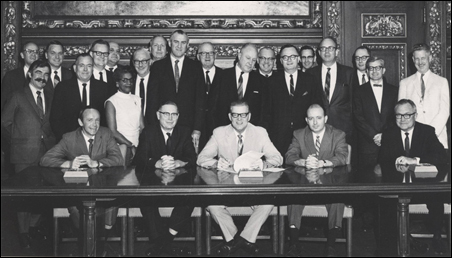April 27, 1967
Dr. Martin Luther King Jr. speaks about racism, poverty, and the Vietnam War to a crowd of 4,000 students at the University of Minnesota. Civil rights legislation, King says, has “rectified some evils of the South, but did little to improve conditions for millions of Negroes in teeming ghettoes of the North.” Congress has passed the 1964 Civil Rights Act, but King cites continuing inequalities in northern cities, such as a high black unemployment rate, segregated schools, and the growth of ghettos surrounded by suburbs. *
One can be inspired by only reading the words of Reverend Dr. Martin Luther King. Yet to those who heard the timbre of his voice and saw the gravitas with which he carried himself that clear Thursday on the lawn of the Agriculture Campus of the University of Minnesota; it must have felt like a dream. Sometimes, one just knows that they are witness to greatness.
King begins his speech with an acknowledgment of the success of de-segregation and passage of the Civil Rights Act of 1964, but goes on to state that legislative victories “did very little to penetrate the depths of Negro deprivation.” ** He wonders, aloud, if our society is more opposed to Commissioner Bull Connor and Sheriff Jim Clarke of Birmingham, Alabama than positively for equality and justice. He suggests of the civil rights movement, that the “need is for legislation strongly enforced”, and this would best occur if we were to “make civil rights crimes Federal” offenses. ** (For readers outside the U.S., Federal jurisdiction means that our national government would enforce these laws rather than the city, county, and state.)
Moving on to the economic issues and disparities Black Americans faced in the cities, Reverend King underscores the urgency to both make and enact plans to better their lives stating “our summers of riots are caused by our winters of delay.” ** Dr. King opined that many in white society were not aware or accepting of the type of unemployment and price gouging faced by these neighbors, or that there is “literally a color tax in the ghetto.” ** His solution to this problem could be summed in his phrase “to attack poverty directly by guaranteeing an annual income for all the families of this country.” **
Addressing another political “hot potato”, Dr. King challenged the perceptions of his audience, and our nation’s worldview. Though criticized by some as being overly empathetic to socialist causes, his outlook could be construed as running parallel with the logic of libertarians; if we practice human rights at home, it is natural that we exude healthy human rights in our foreign affairs. Please, try to read and consider his quotes on Viet Nam with this in mind?
“We’re on the wrong side of a world revolution. We tend to see every revolution in the world as a communist revolution. And our tragedy is that we’ve based our total foreign policy on a huge miscalculation…” **
And
“Injustice anywhere is a threat to justice everywhere. I’m concerned about justice for everybody the world over.” **
At the end of his speech, Martin brought things back to the folly of the human heart. Do we believe in the freedom of our rivals, of our detractors, and of those who genuinely oppose us? You make recognize pieces of his, perhaps most famous speech; “ I Have a Dream”.
“I believe we can build right here, if we will only do these things, a nation where everyman will respect the dignity and worth of human personality and this will be that glad day when all of G-d’s children: black men and white men, Jews and Gentiles, protestants and Catholics, will join hands and sing in the words of the old Negro spiritual;
“Free at last! Free at last! Thank G-d Almighty we’re free at last!
University of Minnesota Professor, John Wright, an attendee of King’s speech, gives us insight into the personal and public impact of that day in 1967. Because of King’s presence, He committed himself to the civil rights of Minnesotan’s, and participated in the 1969 student protest and take-over of Morrill Hall. ***
“I think we can be proud of the staying power of several of the institutional outcomes of the whole protest and take-over process. Of course, the creation of the Martin Luther King Programs in the College of Liberal Arts, and the formation of the Department of African American and African Studies.” **
Now, Eternal Father, we make a request to sit with You in the presence of the Council of Heaven as we meditate on April 27th, 1967. Today we remember the future the Apostle John recorded and prophesied of Your peoples.
“And they sang the song of Moses the Servant of God and the song of The Lamb. They were saying: “Great and marvelous are your works, LORD JEHOVAH God Almighty. Just and true are your works, King of the universe.” “ **** Revelation 15:3 Aramaic Bible
We thank You for the reminder in this single verse of the revelation that we, humanity, have been shown through the Law (Moses), and through the unparalleled grace and forgiveness of all separation through the Cross, the Blood, and the Resurrection of our Messiah! We cannot say thanks enough for the favor shown to all peoples at all times throughout the history of the human race!
Lord of Lords, will You help us today as we revisit this speech of Reverend King some 54 years ago? What in his message brings You glory, and what in his message does not? May we have a conversational prayer with You and acknowledge to You, first, the offenses of our society past that we can be freed from their misbeliefs and unbeliefs?
We applaud the successes of King’s movement of de-segregation. The ground at the foot of the Cross is completely flat, and so should our civic laws be completely apportioned; an even application of rights and privileges for all Americans! We remember this core “heart value” within the Civil Rights movement. We invite You into the brokenness of 1967, and acknowledge the offense of our society to misuse the Law (Moses), and bitter root judgments that created a legal system that negated justice to black Americans. Will You forgive us this offense against You and Your Image within all Americans of African descent; in King’s era, the present, and until Your return?
As a second thought in this conversational prayer, we hear and ponder Dr. King’s words very carefully. As a paraphrase, we hear this message; local laws and enforcement have failed, thus King suggests making “civil rights crimes Federal offenses”. While understandable the King could arrive at this conclusion given the context of intense conflict, it is understandable while these words would also cause conflict. To Americans who connected with King’s heart, it was completely logical.
However, to those who are aware of the positive and negative limits on our Federal, State, County, and City governments, it presents a drastic change. Our Founders, for many reasons, sought to create a legal system like a family walking in the rain: father’s umbrella covers mother, mother’s umbrella covers the kids, and the kid’s umbrella covers the dog. Our system is reliant on leadership and authority to be: relational, nearby, and accountable to the governed.
Is this, perhaps, a logistical fallacy or root misbelief in Reverend King’s logic? If local government has failed it’s people, which is in a much more direct relationship to its citizens, how will moving the center of responsibility to Washington D.C. make it more accountable to locals? For example, “It’s the government that has failed African Americans of Alabama, so we will look to the government, far away and less accountable, to provide a more equitable solution?” Lord, I may be simple, but doesn’t that sound like repeating the same action and expecting a different result?
So, we come humbly to You with a broken spirit over this question; “What do we do when those closest to us deny us justice?” Will You unravel these tangled root judgments of the 1960’s and bring them up, out, and onto the Cross of Christ? Will You bring Your justice to these places, where every rung of authority from City, to County, to State, to Federal had failed our citizens? Will You forgive us where we placed more hope in the law (Song of Moses), than in Healing Presence and unmerited favor of the Redeemer (Song of the Lamb)? Come and bring Your civil rights to our civil wrongs!
For the next item of this meeting, we start with a point of order brought so eloquently by MLK; “Father, when is the right time for collective responsibility versus individual responsibility as it applies to economics?”
I refer here to the words of King’s speech, Lord:
“our summers of riots are caused by our winters of delay.”
“literally a color tax in the ghetto.”
“to attack poverty directly by guaranteeing an annual income for all the families of this country.”
Bring Your insight, Holy Spirit, let us move with You, see from Your point of view, and hear from Your Word.
In Your Eternal Word we see examples of individual responsibility towards YHWH:
“Love LORD JEHOVAH your G-d from all your heart and from all your soul and from all your possessions.” Deuteronomy 6:5 Aramaic Bible ****
“I am YHWH your Elohim, there will not be for you another god before me.
You will not make for you an idol and you will not bow down to them, for I am YHWH your Elohim.
You will not take the name of YHWH your Elohim in vain.” Exodus 20:1-4 Ancient Hebrew *****
(Lord, we notice that every pronoun is personal in these 10 Commandments.)
In Your Eternal Word, we also see examples of collective responsibility for the sin of an individual:
“But the Israelites were unfaithful in regard to the devoted things; Achan son of Karmi, the son of Zimri, the son of Zerah, of the tribe of Judah, took some of them. So the Lord’s anger burned against Israel.” Joshua 7:1 NIV ****
Or we see collective judgement for the offense of an individual ruler:
“Now at midnight the LORD struck down every firstborn male in the land of Egypt, from the firstborn of Pharaoh, who sat on his throne, to the firstborn of the prisoner in the dungeon, as well as all the firstborn among the livestock.” Exodus 12:29 BSB ****
Lord, hear our prayer! Let us first love You, with all we are including our possessions and property whether small or great! We are guilty of making our economic worth an idol, therefore, breaking the first of Your commands! We have tainted Your Name, our family name, our ethnicity’s name through our own individual actions; even in the plunder of an enemy?! Individual leaders in our history, separated from You and hard of heart, have brought suffering and death on the innocent and powerless! We acknowledge our guilt, collectively and as individuals, to You and our neighbor! Will You heal the past, free the present, and bless the future of these economic wounds: within us, in our society, and in Your Body the Ekklesia?
As a third petition and reflection, help us ponder Reverend King’s views on war, and the Viet Nam war in particular. Living Word, let’s think on King’s words given this Thursday in 1967; “We’re on the wrong side of a world revolution. We tend to see every revolution in the world as a communist revolution.” What say You, Rauch Ha’ Kodesh (Holy Spirit)?
Granted, as the political entity known as the United States, we surely had a foreign policy bent on containing Communism in Southeast Asia. Further, President Eisenhower had warned our nation of the drive to power and profit of the “military industrial complex”. Help us remember a bit more, Lord?
China, once an ardent ally of the United States with a proud heritage for millenia, had fallen to Mao in 1949. (Mao’s social justice record was stained by the blood of tens of millions of his own people at the time of this speech.)
Korea, again an ancient people, was split in two with the military support of China and Russia 27 July 1953. (Again, Russia’s record of social justice was stained with the blood of tens of millions of Stalin’s own people.)
The Second Indochina War, commenced on 1 November 1955 had already ravaged the nations of Vietnam, Laos, and Cambodia for 12 years at the time of Dr. King’s statement.
All this to say that the politically aware in 1967 could plausibly see the wasting of human lives in Southeast Asia as a threat to human dignity and human rights. On this issue, Lord, Dr. King’s views seem at odds with his present tense realities at the time of this speech. As a man with such empathy for the downtrodden, I suspect his heart overruled his head on this matter. Even the FBI alleges that close friendships within King’s circle like Hunter Pitts O’Dell, Abner Berry, and Miles Horton had formed in communist schools and camps in the South like the Highlander Folk School in Monteagle, Tennessee about 1957. A counter-argument to this narrative is that it was one of the few forums in the South where black Americans were welcomed with open arms to: speak, listen, receive free education, and socialize in a multi-cultural setting. ******
This information creates tension in me. On the one hand, it appears Your Body, the Church, had failed to welcome Dr. King and African Americans in general into community. What does this say about Your Body of Believers in the Southern United States of King’s era? Had it calcified the warmth of the Gospel into a stiff, arthritic religion? Were the various denominations more subject to the beliefs, misbeliefs, and unbeliefs of their regional culture than the relational culture of Your Kingdom?
Hear our prayer; will You forgive us, the Ekklesia (those called out of the past and into Your Presence and future), of the judgments of their siblings and Your children; the black American human being? Will Your release Your Body from the “sleeper hold(s)” of the Enemy of all humanity: our religious spirit, of our embrace of cultural lies, of our collective and individual beliefs, unbeliefs, and misbeliefs that so deeply offend the Holy Spirit? Bring healing to this memory of Dr. King’s generation, and empower us to practice Your Healing Presence for ourselves and especially our neighbors of a differing race?
On the other hand, how does a Baptist preacher, (Rev. King), align his Biblical worldview with an atheist one? How does King marry the Gospel’s view of history, one that all men can believe in Your Son and be saved, with a Marxist historiography that is often deterministic and pegs human beings into camps limited by one’s external racial markers rather than one’s internal markers? Father, it’s not my heart to judge Dr. King for having friends of various political views, but perhaps it can explain some of sympathies in the Vietnamese War.******
In sum, we appeal to heaven with MLK of April 27th, 1967 that we learn and practice to be “Free at last”! We acknowledge to You that even our icons and heroes of history are human like us with motive conflicts. We so fully believe and misbelieve in You at the same time! We judge our judgers as they counter-judge us! May we radiate the justice of our Eternal King everywhere through confessing our threats and unjust hearts everywhere! May we respect the dignity and worth of Your Infinite Personality first! All our racism, human to human, is first an offense to the Author, Creator, and Lover of the human race! May we avoid the wrong side of a world revolution! May we align with the Song of Moses (Judgement and Just Law) and with the Song of the Lamb (Unending Mercy)! May we love our enemy and do good to those who oppose us until we are all children of our heavenly Father again! We love You and need You to survive! Amen.
One Nation with One King
“Again the word of the LORD came to me, saying, “And you, son of man, take a single stick and write on it: ‘Belonging to Judah and to the Israelites associated with him.’ Then take another stick and write on it: ‘Belonging to Joseph—the stick of Ephraim—and to all the house of Israel associated with him.’ Then join them together into one stick, so that they become one in your hand.” Ezekiel 37:15-17 BSB
Joseph (Yosef)- means ‘he will add”
Ephraim- means simultaneously “ashes” and “to make doubly fruitful”
Father, is this a symbol or foreshadowing of the Cross? Christ takes our ash pile, adds His life to it, and makes us doubly fruitful? You took the divided nations of Judah and Israel and made them one nation. May You join our divided nation(s) again!
- P.T.H. cites timeline formerly at this URL: mnhs.org/about/dipity_timeline.htm
** Minnesota Experience. Twin Cities Public Television. PBS. “Martin Luther King in Minnesota”. Restored by Minnesota Historical Society
A discovered tape of a speech given by Rev. Martin Luther King, Jr., at the University of Minnesota in 1967; followed by an interview of Dr. Martin Luther King Jr. by host L. Howard Bennett for a discussion on ideas, methods and words of wisdom on how to achieve the goal of a free society for all.
Premiere Date: January 21st, 2019 (Cites speech of MLK April 27, 1967.) Internet. https://www.tptoriginals.org/martin-luther-king-in-minnesota-full-episode/
*** Maas, Susan. “Remembering the Morrill Hall Takeover”. University of Minnesota Alumni Association. 2019. Internet.
https://www.minnesotaalumni.org/stories/remembering-the-morrill-hall-takeover
**** Citations of Revelations 15:3, Deuteronomy 6:5, Joshua 7:1, Exodus
https://biblehub.com
***** An excellent version of the Ten Commandments both in ancient Hebrew and English. https://www.ancient-hebrew.org/biblical-history/files/bible_ten_short.png
****** https://www.appalachianhistory.net/2018/01/school-for-subversives-and-communists.html


